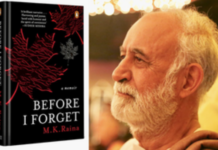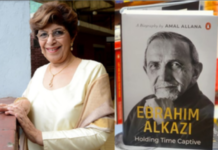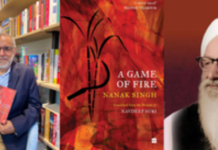New Delhi– (Editor’s Note — TV journalist, blogger and newspaper columnist Vishnu Sharma has painstakingly put together a book titled ‘Indira Files’, whose blurb makes it clear what it sets out to do. It is indeed a ‘Critical Look at the Controversial Side of Indira Gandhi.”
It is not only a ‘critical look’, but also a timely reminder of how the late former prime minister repeatedly subverted constitutional institutions, tinkered with the basic features of the Constitution using the 42nd Amendment, promoted dynastic rule, pulled back no punches to silence her political critics, Jaipur Rajmatra Gayatri Devi being one notable instance, and nurtured future Frankesteins such as Khalistani terrorist Jarnail Singh Bhindranwale.
An easy-to-read book for all those interested in recent Indian history, studded with episodes that have slipped into the recesses of public memory, ‘Indira Files’ (Prabhat Prakashan; Rs 600) is a good read.
In the excerpts that follow, the author exposes how Indira Gandhi (and her favourite son, the late Sanjay Gandhi) did not spare even sports and let national sports federations be hijacked by political operatives, thereby creating a legacy of mismanagement.
BOOK EXCERPTS
* Political interference in sports institutions
In 2021, when the men’s hockey team won a bronze medal in the Olympics after 41 years, the Narendra Modi government immediately changed the name of the country’s most prestigious sports award from ‘Rajiv Gandhi Khel Ratna Award’ to ‘Major Dhyan Chand Khel Ratna Award’.
In these circumstances, once again the argument of why there is so much political meddling in sports institutions surfaced. Why are so many stadiums named after politicians? When during Pandit Nehru’s era the football team travelling to the Olympics did not even receive shoes or when during Indira Gandhi’s era, famous actor Pran had to step forward for Kapil Dev’s bowling training at a foreign academy? The Congress, too, questioned the naming of the nation’s largest stadium after Prime Minister Modi.
In such a situation, you ought to be aware of an intriguing episode from Indira Gandhi’s tenure. Though it wasn’t the beginning, yet the fact that an Air Force officer replaced an elected Indian Olympic Association (IOA) president over a phone call, shows how autocratic the regime was.
Elections are held in accordance with the IOA’s constitution every three years, therefore following 1974, elections were scheduled for 1977. The country’s situation, however, changed following the Emergency in 1975. People had the impression that the institutions for sports would remain unaffected, but the sycophants accomplished a lot of what they wanted through mother and son during the Emergency.
In 1976, the Montreal Olympics were scheduled. Former Punjab chief minister Amrinder Singh’s uncle, Raja Bhalindra Singh, was the president of the Indian Olympic Association. It is ironic that although he was a cricketer, he was made the IOA President. It is a different matter that the two presidents before him were from his family. One was his father, Patiala’s Maharaja Bhupinder Singh, and the other was his brother and Captain Amrinder Singh’s father, Raja Yadavindra Singh.
* Phone call from Sanjay Gandhi gets IOA president replaced
Sanjay Gandhi used to live in the Prime Minister’s house back then. The Prime Minister’s office was located in the bungalow next door. Additionally, he was given two phones without any obligation and every call of his weighed equal to a word from the Prime Minister’s office.
The IOA received an order from Sanjay Gandhi that Om Prakash Mehra, who served as the Air Chief Marshal between 1973 and 1976, be appointed the association’s president.
Despite the representatives of all the sports federations being present at the meeting, no one objected to the choice, so in the middle of Raja Bhalindra Singh’s term, Om Prakash Mehra was chosen to head the IOA. The Gandhi family had a special fondness for him. He was awarded a Padma Vibhushan two years later and was subsequently appointed governor of Rajasthan and Maharashtra.
* For the first time, India did not win a medal at the Olympics
Air Chief Marshal Om Prakash Mehra had absolutely nothing to do with sports prior to his appointment. To be considered for the position he held, one must have served as president of a state or national sports association. But it did not matter as long as he had Sanjay Gandhi’s blessings.
As a result, the nation suffered. Right before the Montreal Olympics, he was made IOA president, but India failed to bring home even a single medal. The men’s Indian hockey team, which had been coming home with medals since 1928, returned without one for the first time.
It is another matter, though, that Raja Bhalindra Singh had to be reinstated because the Janata Party, immediately after assuming power, cancelled all political appointments, including that of Air Chief Marshal Mehra.
When Indira later assumed leadership again in 1980, she had to first shed the ‘dictator image’ of her Emergency period. The 1982 Asian Games offered her the chance she needed under those circumstances. Pandit Nehru barely interfered in the 1951 Asian Games.
The book ‘India and the Olympics’ by Boria Majumdar contains a gripping narration of how Indira Gandhi skillfully exploited the 1982 Asian Games as a platform to improve her reputation at home and abroad. The 1982 Asian Games were even dubbed the ‘Indira Games’ by Buta Singh, who was a member of her council of ministers.
* Rajiv Gandhi’s entry into sports politics
The foreign media jokingly began to refer to Indira Gandhi as the ‘Empress of India’ during the Emergency. To promote the Asian Games, she organised Festivals of India in various nations, including Russia, America and Britain. When Indira Gandhi arrived in London for one such festival, she had to declare, “I hope you will stop calling me the Empress of India now.”
It is true that Delhi saw the construction of a number of stadiums and flyovers in just a couple of years. Indira Gandhi established the Asian Games Special Organising Committee, which had 33 members, over and above the IOA to get the process moving faster. It included six Union ministers, a number of chief ministers, 11 secretaries, and directors of the security forces, such as the BSF and CRPF, along with senior DDA, DD and All India Radio officials.
In truth, Jagmohan, who eventually rose to the position of a minister in the Atal Bihari Vajpayee government, should have received a bigger portion of the credit for organising the Asian Games. Only Jagmohan had the determination to establish the infrastructure during the Asiad, including the Jawaharlal Nehru Stadium, Indira Gandhi Indoor Stadium, Talkatora Swimming Pool, Karni Singh Shooting Range and the Games Village, all within two years.
Particularly interesting was Rajiv Gandhi’s inclusion in the committee. He had suddenly become active following Sanjay Gandhi’s death and was elected the MP from Amethi, Sanjay’s constituency. When the Prime Minister’s son is a member of the committee, it is only natural that he will be the one in charge, and that is exactly what happened.
Indira Gandhi made excellent use of the Asian Games to boost her reputation, but government meddling in sports events had also increased, which continued even later.
After Raja Bhalindra Singh, Indira awarded her trusted adviser Vidya Charan Shukla the position of IOA President in 1984. Since then it developed into a tradition. The ‘Rajiv Gandhi Khel Ratna Award’ was proclaimed one day as the highest award in the area of sports as an effort to appease the Gandhi family.
* The story of a controversial postage stamp for Asiad
You can understand from this incident how politics used to dominate sports, even during Indira Gandhi’s time. You must have seen a social media post where a postage stamp has been shared. The postage stamp is from the 1982 Asian Games. It features an imprinted image. The image depicts a match between two wrestlers.
The public perhaps did not pay attention to the image then. In any case, there were no social media platforms available to the general public back then.
It is possible someone might have protested back then, but today that image and the postage stamp demonstrate the filthy mentality of not only Indira Gandhi but also the Congress government. Understanding the wrestling scene is essential to comprehend the entire narrative. In fact, in that image a Turkish wrestler is ready to lift and slam his rival, who is sporting a ‘choti’.
The choti is a sacred identity symbol in India. It is possible that this stamp had the Brahmins as its target. First, you are portraying an Indian wrestler being thrashed, and then, as Prime Minister, you are encouraging casteism using official channels.
It is possible that Indira Gandhi might not have actually ordered this herself. It does, however, demonstrate that she had no influence over the judgements made by others around her and that she had a history of making important decisions in a hasty manner. Or was she trying to win over Muslims with this gesture? Either way, Indira Gandhi’s reputation suffered in this situation.
* Pran stepped forward to help Kapil Dev when the government couldn’t
One of the major sporting accomplishments of Indira Gandhi’s era was India winning the Cricket World Cup. Indira Gandhi can still be seen with the victorious cricket team in old photographs.
You must have seen the Ranveer Singh film ’83’ to understand how much the government assisted this team. You will discover the truth as well as the players’ perception of the Rs 25,000 incentive as fake news.
Before being named captain, Kapil Dev wished to visit Australia to improve his bowling skills. The BCCI, however, lacked the funds at the time.
Looking at these circumstances, Khalid Ansari published an announcement in his magazine saying that he was willing to cover Kapil’s airfare if a sponsor was found to cover the rest of the cost! When well-known actor Pran found out about this, he instantly declared that he was willing to cover all costs associated with Kapil Dev’s travel to Australia, including airfare and other expenses.
At that time, Pran had also written a letter to the BCCI saying, “If you do not have money, I am ready to pay all the expenses, but send a talented player for training nonetheless.” The impact of that letter was so great that the Board decided to pay for all of Kapil Dev’s training expenses.
Later, Kapil Dev thanked Pran profusely. The government, though, remained indifferent. It did not recognise Kapil Dev till he brought home the World Cup. (IANS)














